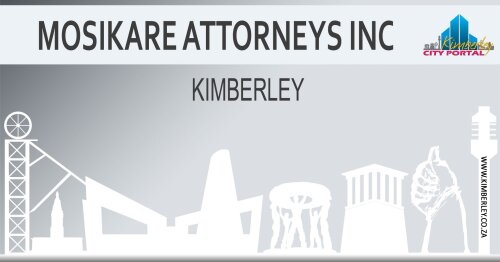Best Restructuring & Insolvency Lawyers in Kimberley
Share your needs with us, get contacted by law firms.
Free. Takes 2 min.
List of the best lawyers in Kimberley, South Africa
South Africa Restructuring & Insolvency Legal Articles
Browse our 2 legal articles about Restructuring & Insolvency in South Africa written by expert lawyers.
- Cross-Border Insolvency: Protecting Assets in South Africa
- Legal Framework: South Africa governs cross-border insolvency through the Cross-Border Insolvency Act 42 of 2000, which incorporates the UNCITRAL Model Law. Mandatory Recognition: Foreign liquidators or "representatives" have no standing to deal with South African assets until they obtain a formal recognition order from a South African High Court. COMI... Read more →
- Business Rescue Proceedings in South Africa for Directors
- Business rescue is a formal rehabilitation process designed to save "financially distressed" companies from liquidation. A general moratorium is triggered immediately, providing legal protection against creditor claims and asset seizures. The Business Rescue Practitioner (BRP) takes full management control of the company, effectively displacing the board's autonomous authority. Directors face... Read more →
About Restructuring & Insolvency Law in Kimberley, South Africa
Restructuring and insolvency law in Kimberley, South Africa, is a legal area focused on helping individuals and businesses address severe financial distress. Restructuring refers to formal or informal processes that help organizations reorganize their debts and obligations to regain financial stability. Insolvency, on the other hand, indicates a state where an individual or company can no longer meet their financial commitments as debts become due. Kimberley, being part of South Africa, follows the broader framework set by national legislation, but local professionals are equipped to handle region-specific concerns and provide guidance through the complex procedures involved.
Why You May Need a Lawyer
There are many reasons why individuals or businesses in Kimberley may seek legal assistance in this field. Common situations include:
- Overwhelming debt making it difficult to pay suppliers, employees, or creditors
- Threats of legal action from creditors or collection agencies
- The need to rescue a business from collapsing through restructuring or business rescue proceedings
- Uncertainty about the legal implications of declaring bankruptcy or insolvency
- Disputes between creditors and debtors regarding repayment or asset distribution
- Dissolution or liquidation of companies and the need to manage liabilities lawfully
- Advice on negotiating settlements with creditors to avoid formal insolvency
Lawyers with experience in restructuring and insolvency understand the local landscape and legal requirements. They can provide critical guidance, representation in court, and negotiation skills to achieve the most favorable outcome in challenging financial circumstances.
Local Laws Overview
In Kimberley, restructuring and insolvency matters are mainly governed by national legislation, specifically the Companies Act 71 of 2008 and the Insolvency Act 24 of 1936. These laws establish the legal framework for business rescue, liquidation, sequestration, and other debt resolution mechanisms. Several key aspects are particularly relevant:
- Business Rescue Proceedings: This is a legal process available to financially distressed companies. An independent practitioner is appointed to oversee restructuring efforts and help the company avoid liquidation where possible.
- Sequestration: This refers to the insolvency process for individuals or partnerships, where the court declares a person insolvent and appoints a trustee to manage their assets for the benefit of creditors.
- Liquidation: When a company is insolvent, it may be wound up voluntarily or by court order. Liquidators are appointed to realize the assets and distribute them according to priority among creditors.
- Debt Compromise: Debtors can seek legal settlements with creditors to avoid further legal action and achieve manageable repayment terms.
It is important to note that Kimberley residents must approach the High Court for many restructuring and insolvency procedures, as it has the jurisdiction in these matters. Strict timelines and documentation requirements apply, making professional guidance strongly recommended.
Frequently Asked Questions
What is the difference between restructuring and insolvency?
Restructuring involves reorganizing a company or individual’s finances to regain stability, often through negotiation or court-approved plans. Insolvency is the state of being unable to pay debts, which can lead to formal processes such as sequestration for individuals or liquidation for companies.
How do I know if I or my business is insolvent?
Generally, insolvency is determined if your liabilities exceed your assets or if you are unable to meet financial obligations as they fall due. A professional assessment can help confirm your financial status.
What is business rescue and when should it be considered?
Business rescue is a formal process initiated when a company is in financial distress but has a reasonable prospect of recovery. A business rescue practitioner helps restructure debts and operations to avoid liquidation.
Can individuals declare themselves insolvent?
Yes, individuals who cannot meet their debts may apply for voluntary sequestration through the High Court. The court assesses whether sequestration is appropriate and appoints a trustee to handle the process.
What happens to my assets if I am declared insolvent?
Insolvent individuals or companies have their assets placed under the control of a trustee or liquidator, who is responsible for selling assets and distributing the proceeds among creditors according to legal priorities.
Will I lose my house or car if I undergo insolvency?
This depends on the specific circumstances, the value of the estate, and exemptions allowed by law. Often, essential items may be excluded from liquidation, but significant assets like property or vehicles may be sold to satisfy creditors.
Can debt be negotiated without formal insolvency proceedings?
Yes, in many cases, debt can be settled through negotiation, payment plans, or compromises. Many lawyers and debt counselors can assist with these arrangements to avoid court proceedings.
How do creditors recover money in an insolvency or liquidation?
Creditors must submit their claims in the estate or liquidation process. Payments are made according to a legal hierarchy, with secured creditors generally being paid before unsecured creditors.
How long does insolvency or liquidation take in Kimberley?
The time frame varies depending on the complexity of the estate, the number of creditors, and court schedules. Simple matters can be resolved in a few months, while more complex cases may take a year or longer.
Do I need a lawyer for restructuring or insolvency matters?
While it is not legally required in all cases, professional legal guidance ensures compliance with procedural rules, improves negotiation outcomes, and protects your interests throughout the process.
Additional Resources
For those seeking more information or assistance with restructuring and insolvency in Kimberley, the following resources and organizations can be helpful:
- Master of the High Court (Kimberley): Responsible for the administration of sequestrated and liquidated estates.
- South African Revenue Service (SARS): For matters relating to tax obligations in insolvency or liquidation.
- Companies and Intellectual Property Commission (CIPC): For company registration, deregistration, and business rescue filings.
- Local Kimberley Law Firms: Many firms have attorneys specializing in restructuring and insolvency who offer consultations and legal services.
- South African Restructuring and Insolvency Practitioners Association (SARIPA): An industry body representing professionals in this field.
Next Steps
If you are facing financial distress, or you are a creditor with concerns about recovering debts in Kimberley, it is important to take the following steps:
- Assess your financial position and gather all relevant financial documents
- Consult a local attorney or insolvency practitioner with experience in restructuring and insolvency
- Discuss your options, including informal restructuring, business rescue, sequestration, or liquidation
- Prepare all necessary documentation as required by local procedures and courts
- Follow the advice of your legal professional to ensure compliance with all legal requirements and to protect your interests
- If required, attend meetings or court proceedings as scheduled
- Stay informed about your rights, obligations, and the progress of your case
Restructuring and insolvency can be complex and stressful, but with proper legal advice and the right approach, you can navigate the process in the most effective way possible. Do not hesitate to seek professional help to protect your financial future and legal rights.
Lawzana helps you find the best lawyers and law firms in Kimberley through a curated and pre-screened list of qualified legal professionals. Our platform offers rankings and detailed profiles of attorneys and law firms, allowing you to compare based on practice areas, including Restructuring & Insolvency, experience, and client feedback.
Each profile includes a description of the firm's areas of practice, client reviews, team members and partners, year of establishment, spoken languages, office locations, contact information, social media presence, and any published articles or resources. Most firms on our platform speak English and are experienced in both local and international legal matters.
Get a quote from top-rated law firms in Kimberley, South Africa — quickly, securely, and without unnecessary hassle.
Disclaimer:
The information provided on this page is for general informational purposes only and does not constitute legal advice. While we strive to ensure the accuracy and relevance of the content, legal information may change over time, and interpretations of the law can vary. You should always consult with a qualified legal professional for advice specific to your situation.
We disclaim all liability for actions taken or not taken based on the content of this page. If you believe any information is incorrect or outdated, please contact us, and we will review and update it where appropriate.













